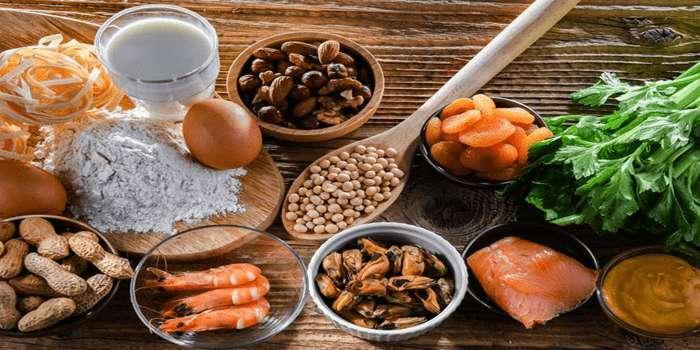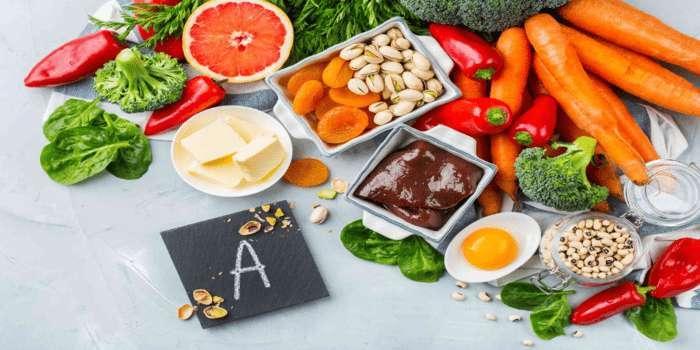Detailed Guide On Top Vitamin A Foods, Benefits, Recipes, And More
Mar 04, 2024 By Madison Evans
Without any shadow of a doubt, Vitamin A is an important nutrient in our body and plays a vital and critical role in maintaining the health of the eyes. Moreover, it is beneficial for vision, neurological function, hormonal reproductive health, and healthy skin.
It supports the kidneys, liver, digestive organs, and lungs. Carrots have a rich amount of Vitamin A. You can find numerous nutrients that we need for our body's health. If you are wondering what foods and recipes containing this vitamin you can add to your diet, this article can be a sweet spot for you.
So, keep reading to explore the great Vitamin A foods list, benefits, and recipes.
Good Source Of Food TO Get Vitamin A

- Fish oils
- Eggs
- Beef liver
- Tomatoes
- Red bell pepper
- Cantaloupe
- Mango
- Leafy green Vitamin A vegetables like broccoli, kale, spinach
- Orange
- Yellow vegetables like pumpkin, summer squash, sweet potatoes, carrots, winter squash
Benefits Of Foods With Vitamin A

Numerous kinds of vitamin A are found in our bodies and have benefits and different roles. A few functions of this nutrient are to maintain the strength of bones, fetal development, gene regulation, cell differentiation, immune function, and clear skin. Below are some main benefits of Vitamin A.
Vision Support
Vision is a core part of our life; retinal is the kind of vitamin A required for vision. When the light falls into the retina, the human eye molecule, which is also called rhodopsin, is activated. Thai-activated rhodopsin transfers signals to the brain, which gives vision. Just imagine Vitamin A as a leader for your eyes.
It helps to see in the dark by making rhodopsin. If you do not get enough of this nutrient, then you might struggle with night vision and, in serious cases, even go blind. Eat rich Vitamin A fruits and vegetables that have beta-carotene; it prevents problems, provides additional protection, and keeps vision strong.
Immune Support
Vitamin A is also beneficial to support the immune system, and it is famous as an immune-boosting Vitamin, just because some immune systems are dependent on limited amounts of vitamin A antioxidants and intake activity.
Usually, genes are involved in getting a response from the immune system and are controlled by Vitamin A. Deficiency in this nutrient can lead to overall weakness and boost infections of the immune system.
Vitamin A is needed for B-cells and the building of both T-helpers. Beta-carotene helps immunity by working as a strong antioxidant and support to prevent all kinds of chronic illnesses.
Skin Health and Cell Growth

Poor skin, including irritation, dryness, breakouts, and infections, is the core sign of poor skin health; Vitamin A helps to tackle these issues internally and externally. It is required to produce glycoproteins, a mixture of protein and sugar, that support the cells tied together to set up soft tissue.
It is essential for skin regrowth and wound healing. Deficiency may lead to a bad complexion, and research has proven that rich amounts of Vitamin A foods are beneficial to fight acne and maintain overall skin health.
Carrots, leafy greens, berries, and eggs are the best vitamin A foods for skin and also supply some important nutrients to your skin.
Reproductive Health
Vitamin A is not just good for your eye health but also plays a vital role in reproductive health. During pregnancy, Vitamin A ensures complete fetal growth and helps to develop the baby's organs, such as lungs and heart.
It is beneficial to repair the C Section injuries, too. It's a complete package for your reproductive system. Whether you plan your family, Vitamin A suits you best. Foods that are good for pregnant women and have a lot of Vitamin A are yellow and orange fruits, leafy vegetables, papaya, and mangoes. Eggs and milk are natural resources to get Vitamin A.
Delicious Healthy Recipes with Vitamin A Nutrient
Greek-Style Pizza
- Step 1: Preheat your oven to 425°F.
- Step 2: Take a big cookie sheet, and do not get upset by greasing it. Take a sheet of phyllo pastry and put it on the sheet. Brush a little amount of oil on it, and do the same with other sheets, bruising each sheet with oil.
- Step 3: Sprinkle some crumbled spinach over the phyllo sheet. After that, add some tomatoes, feta cheese, and artichokes on the top and spread them out.
- Step 4: Put it into the oven and bake for around 25 minutes or until the edges start turning golden.
- Step 5: When it's done, carefully move the pizza to a big cutting board.
- Step 6: Use a pizza cutter or a big sharp knife to slice it into 6 or 8 tasty pieces.
- Step 7: Dig in and enjoy your homemade delicious pizza goodness!
Beef and Noodle Stir-Fry
- Step 1: Break noodles into pieces and boil them in a saucepan with water. Bring to a boil and cook for 2-3 minutes until it gets soft; after that, drain the noodles into a basket that has tiny holes. You can mix the seasoning packet th, row it, or use it next time.
- Step 2: Grab a nonstick pot, spray it with cooking oil, and heat it up. Cook the beef for 5-6 minutes until it is completely done, and cook it on both sides by flipping. Then, take it out from the pot.
- Step 3: put some pepper and carrots blend, and cook for 4-5 minutes until it gets cooked and crispy. Add water bromide, stir-fry sauce, cooked beef, and noodles until everything is hot and looks nice. In the end, sprinkle some green onion on top for a good presentation and enjoy the tempting and healthy meal full of Vitamin A.
White Bean and Kale Minestrone Soup
- Step 1: Pour oil into a saucepan and put it on the stove on medium-high heat. Put some mixed vegetables and carrots and cook for 3-5 minutes until it gets ready and tender. After that, add water, beans, tomato sauce, and tomatoes with their juice. Stir fry all and bring it all to one boil.
- Step 2: add pasta and kale to the mixture. Stir it and let it boil gently for about 15 minutes until pasta and kale soften. Give it a stir, and when it is done, serve it with some Parmesan cheese if you like to eat it. Enjoy a simple and delectable meal!
Conclusion
Vitamin A is a good source of boost immunity and good for visual health; it also helps to reduce acne and is helpful in the reproductive system. If you are confused about where we get Vitamin A, then read some simple and delicious recipes to get this vitamin with an enjoyable meal.
In the above article, you get a comprehensive guide to Vitamin A foods list, benefits, and recipes.







